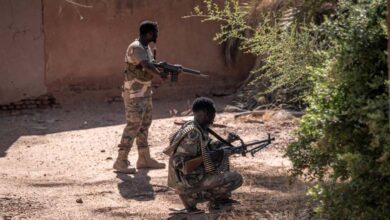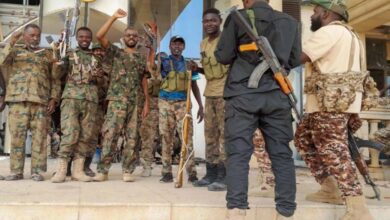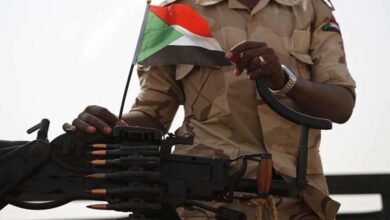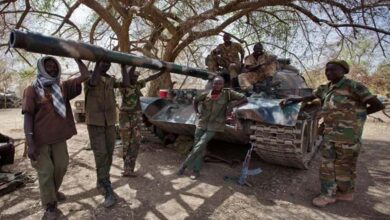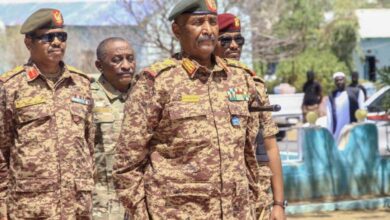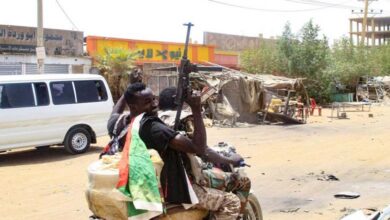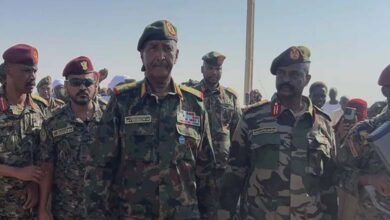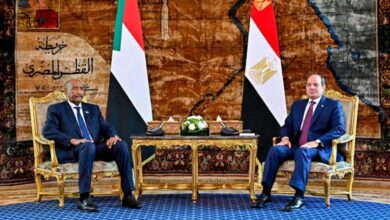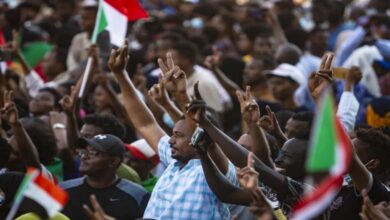The bet of Al-Burhan on what remains of collapsed Sudan in favor of Iran’s will – A move that will turn the tables on him
Diplomatic Relations Reinstated: A Fresh Confirmation of Al-Burhan's Proximity to Iran, an Alliance in Favor of the Rapid Support Forces' Interests

Abdul Fattah Al-Burhan is prepared to stake what remains of the collapsing Sudan for Iran’s will, a move that will turn the tables on him by forces opposing any Tehran presence in the Red Sea.
Khartoum – Sudan’s decision to resume relations with Iran reaffirms that the Chief of the Sudanese Army, Lieutenant General Abdul Fattah Al-Burhan, seeks to strengthen his ties with Tehran and convey messages to regional countries indicating that he has alternatives. Observers believe that this direction will bring more problems to the army chief than gains.
The decision to restore diplomatic relations with Iran follows the revelation by “Al-Arab” on August 9th last year in an article titled “Tehran Invests in Sudan as a Gateway to the Red Sea,” regarding Iran sending a shipment of weapons to the Sudanese army through the eastern Sudan region. This was in exchange for commitments from figures affiliated with the Islamic movement loyal to Tehran, promising cooperation and facilitating its influence in the Red Sea if military support is provided to the army to withstand the war.
The newspaper also confirmed the role played by Sudanese Islamists in tightening the noose on Al-Burhan and pulling him towards ideological alliances in the region. Information circulating about the dissolved National Congress Party’s leaders preventing the return to the negotiating table in Jeddah between the army and the Rapid Support Forces, which expressed readiness for peace multiple times, was also emphasized.
The rapprochement with Iran will have an impact on regional and international stances on the war in Sudan that have taken impartial views against Al-Burhan.
Observers say that this move will have negative repercussions on various regional and international powers’ positions on the war in Sudan, which have adopted impartial views against the army chief. This development favors the Chief of the Rapid Support Forces, Lieutenant General Mohamed Hamdan Dagalo (Hemeti), who has warned extensively about the dangers of the directions taken by his rival Al-Burhan.
They add that the army chief may burn bridges with many countries that see Tehran as a regional threat and doubt its hidden intentions. The timing of the resumption of relations is not without political messages, indicating a clear challenge from Al-Burhan and his readiness to stake what remains of the collapsing Sudan for Iran’s will and ambitions. This interpretation turns the tables on him by forces rejecting a new approach by Tehran to the Red Sea.
The Central Council member of the Forces for Freedom and Change, Al-Maz Hadrat, described the restoration of relations with Iran as a “strange” decision, stating that Sudanese priorities at this stage should be stopping the war, not initiating relations with “suspicious countries in the region with hostilities towards several regional and international powers.”
In a statement to “Al-Arab,” he pointed out that the move demonstrates that the remnants of the al-Bashir regime completely dominate all state institutions, including the Ministry of Foreign Affairs. He emphasized that the current approach takes Sudan back to the pre-December 2019 revolution stage when the al-Bashir regime was leaning towards countries involved in many polarizations in the region.
He clarified that the relationship with Iran did not benefit Sudan in the past, and Sudanese people expressed their rejection of it, a stance that persists until now.
The Sudanese Ministry of Foreign Affairs stated in a Monday statement that both countries decided to resume relations to serve their interests, open embassies, and agreed to expand cooperation in various fields following high-level talks in recent weeks.
An Alliance in Favor of the Rapid Support Forces
Iranian Foreign Minister Hussein Amir Abdollahian announced on July 6th last year a meeting with his Sudanese counterpart Ali Al-Sadiq, hinting at an imminent resumption of relations after a seven-year hiatus, on the sidelines of the Non-Aligned Movement Foreign Ministers’ meeting in Baku.
Iranian cultural centers in Sudan were closed in 2014, with Khartoum justifying its decision due to the increasing activities of these centers in spreading the Shiite doctrine in the country. Diplomatic relations were officially severed in January 2016 after the storming of the Saudi embassy in Tehran.
Al-Burhan exploits the restoration of diplomatic relations between Riyadh and Tehran to imply the removal of the direct reason for Sudan’s break with Iran, aiming to please Saudi Arabia at that time.
Before cutting ties, Khartoum had good military ties with Tehran during the tenure of former President Omar al-Bashir. Al-Bashir visited Tehran in 2012, describing the relations between the two countries as “solid,” and Iranian ships docked several times at the port of Port Sudan.


